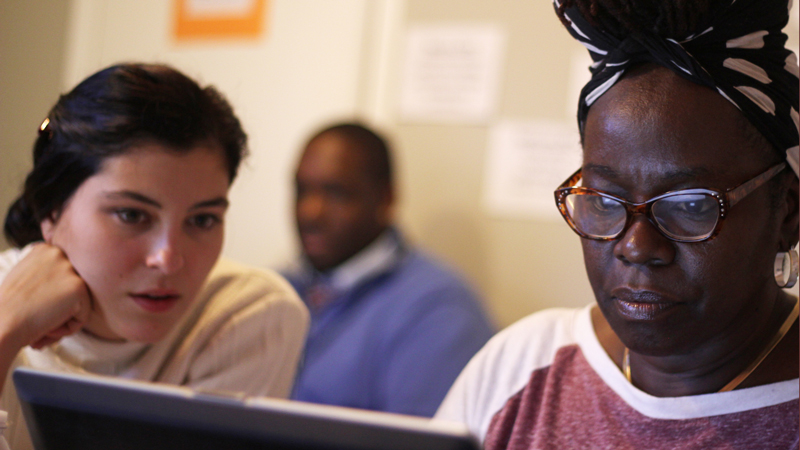Pineville Neighbors Place is a testament to a little-known set of facts: suburbs are not always models of prosperity and education, and they often lack internet resources just as severely as urban and rural communities.
While Pineville is a location for high-end shopping, restaurants, car dealerships, and medical care, it’s also home to the workers who staff these businesses, and who often rely on minimum-wage income. Three years ago, civic leaders realized that residents who needed access to social services often lacked the resources to make their way to agencies and government centers in central Charlotte. They founded Pineville Neighbors Place in 2016.
“The poverty rate in Pineville is between 15 and 20 percent,” said Jane Shutt, executive director. “So what we pledged to do is to have an office in Pineville serve that population, so they can get the help they need. We can connect them to the organizations that provide help, in a convenient location at a convenient time.”
Digital resources are an important part of these needs, Shutt said.
“We’re putting people at such a huge disadvantage if they don’t know how to use computers,” Shutt said. People who lack computer access, either at home or nearby, or who lack digital literacy skills, can’t get access to common services, including job applications, resume creation and distribution, medical insurance applications, and medical or food assistance, she said.
“One of the huge barriers to being able to access computers is that we don’t have a convenient library,” Shutt said. “Years ago, they decided to centralize our library system, which makes sense economically, but makes accessibility very hard. Pineville is in a corner of Mecklenburg County. Our closest library is South County Regional and it’s about six miles away — a 30-45 minute bus trip. If you’ve ever been to South County Regional, you know their computers are booked most of the time. So once you get there, being able to find time where you can actually get on a computer is very difficult.
“We realized early on that we needed to address that issue. We have a couple of laptops available for use at our office. People can come in and use them for tasks such as job applications, checking email and online benefits.” Computer access is particularly important for high school students and their parents, Shutt said, who otherwise must rely on smartphones to write papers, submit assignments online, or access progress reports.
Pineville Neighbors Place is one of five non-profit organizations in the fall 2018 cohort of the Digital Charlotte Program Accelerator. The program delivers a six-week digital and media literacy course to community organizations, and at the end of the course, students receive a laptop computer. The other four organizations this fall are YWCA Central Carolinas, Aldersgate Retirement Community, Beatties Ford Road Vocational Trade Center, and Be the Change / Latin American Coalition.
Funded by Google Fiber and managed by Digital Charlotte, a project of the Knight School of Communication at Queens, the two-year-old program has now graduated more than 125 people with digital literacy certificates and supported 15 non-profit organizations. A new round starts in January 2019, and applications are being accepted.
Rachel Pepper, the lead instructor at Pineville Neighbors Place, said she is rewarded by watching students build skills and confidence. Rachel started volunteering when she was a Queens student, and enjoys helping people reach their goals.
“I have one student who was having a lot of trouble typing and using the mouse to scroll and we’ve been working on that for the last 30 minutes of class,” Pepper said. “Today he just filled out a form, online, by himself. It only took him 10 minutes, but five weeks ago it probably would have taken him an hour. And he was smiling the whole time.”

Above: Regan O’Hara (left) of Youngstown, Ohio, a senior at Queens University, works with Trisha Taylor-Nash, a student in the Digital Charlotte Program Accelerator at Pineville Neighbors Place. O’Hara is one of about two dozen students from Queens’ Knight School of Communication who are supporting five community organizations in the program accelerator this fall.
